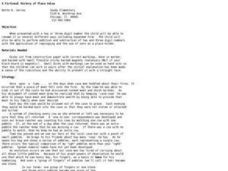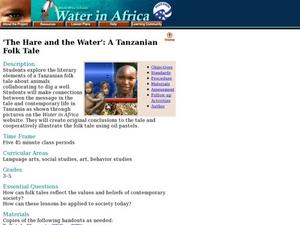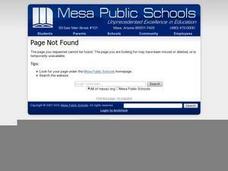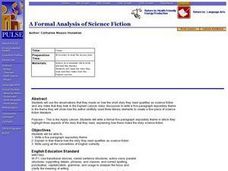Curated OER
Character and Relationship Changes
Fifth graders examine how characters and relationships can change in a text. In this realistic fiction lesson, 5th graders identify changes in the characters and relationships while reading The Great Gilly Hopkins. Students record their...
Curated OER
The Similarities and Differences of Setting
Sixth graders compare science fiction to reality. For this setting lesson students use Chapter 6 of A Wrinkle in Time by Madeleine L'Engle. Students record detailed descriptions from the text that are different of similar to real life.
Curated OER
Equal Protection of the Law: Fact or Fiction
High schoolers focus on the 14th Amendment of the Bill of Rights to decide whether or not racism denies citizens of their rights under the amendment. They watch a movie, Every Two Seconds and complete a worksheet (included in the plan)...
Curated OER
What's Really True? Discovering the Fact and Fiction of Autism
Youngsters investigate autism and autism spectrum disorders. They access a variety of websites which present information on ASD's, and assess how accurate the information they've read actually is. They work in groups and utilize...
Curated OER
A Fictional History of Place Value
Your class can explore standard and expanded notation, as well as computation with regrouping. They listen to a make-believe story about cavemen and the origin of numerals and place value. Then apply what they learned about renaming and...
Curated OER
Determining Author's Point of View: The Sneeches
Determine the author's point of view in a text. Young readers read Dr. Seuss' The Sneeches and identify the author's purpose in the story. They identify persuasive techniques in writing, asking and answering questions to better...
Curated OER
Chrysanthemum
Our uniqueness should be celebrated, not teased. The story Chrysanthemum addresses having a distinct name and dealing with different perceptions. Pre- and post-reading questions are listed to help your learners understand...
Curated OER
Questioning
Practice making predictions by looking at the cover of a book. You can use The Hungry Thing, as suggested here, or any other book you may be reading in class. Use the predictions to talk about good reading strategies. A chart is...
Curated OER
Using a Title to Determine the Main Idea
Use the title of a book to determine the main idea. Readers will view the cover of The Wedding and predict what the story will be about. Graphic organizers help chart important information and build new vocabulary. Other stories are...
Curated OER
The Little Red Hen
Young readers access prior knowledge of how wheat becomes bread. Using "The Little Red Hen" story, learners make predictions of the events. Extension activities include singing a song about the story and making a list of...
Curated OER
Sense, Sensibility and Sentences: Examining and Writing Memorable Lines
Involve your readers in finding works of literary genius. Have each individual write down compelling sentences that they read or hear, whether in a newspaper, advertisement, book, movie, song, or any other place! Once each person has a...
Student Achievement Partners
"The Glorious Whitewasher" from The Adventures of Tom Sawyer by Mark Twain with Mini-Assessment
It's the classic scene: Tom Sawyer is whitewashing a fence. Expose your learners to Mark Twain's humor while reinforcing reading comprehension. Eighth graders are encouraged to read and reread, achieving as much exposure to the text...
Curated OER
The Hare and the Water: A Tanzanian Folk Tale
"The Hare and the Water," a Tanzanian folk tale, lends a global perspective to literary analysis. Learners spend the first two days reading and storyboarding. On day three, they examine folk tale elements (worksheet included), and design...
Curated OER
Laura Joffe Numeroff "If You Give..." Book Activities
Have learners choose activities to complete based on the books by Laura Joffe Numeroff. They are introduced to If You Give a Mouse a Cookie and the other books in this series through prereading activities. They then construct a portfolio...
Curated OER
Differences Between Fiction And Non-Fiction in the Library
Students examine the differences between fiction and non-fiction books in the library by discussing kangaroos. They distinguish between facts about kangaroos, and using their imaginations and imagining what they would do with pet kangaroos.
Curated OER
Understanding Science Fiction
Fourth graders learn about the genre of science fiction. In this science fiction lesson, 4th graders learn about the characteristics of science fiction as a genre. They write an original piece of science fiction.
Curated OER
Writing: Realistic Fiction
Pupils examine websites about realistic fiction. These sites include lists of books that fit into this category and a list of realistic fiction authors. There are also writing prompts to help students write their own realistic fiction...
Curated OER
Blending Fiction and Nonfiction to Improve Comprehension and Writing Skills
Learners explore a content area by reading both fiction and nonfiction texts on the topic. They do more research online about the topic. After comparing the texts, they create their own written original work, using both narrative and...
Curated OER
Fictional Biographies
Students read and discuss the fictional biography, "Strega Nona: Her Own Story" by Tomie dePaola. They compare the characters of the story to other fictional characters then choose their own favorite fictional character to write a...
Curated OER
Historical Fiction - Based on facts or purely fiction?
Students, after reading an Accelerated Reader historical fiction book, research the actual historical time period portrayed in the book. Then, working in a cooperative learning group, they create a HyperStudio presentation.
Curated OER
History: Fact of Fiction?
Students find a historial novel online and distinguish between fiction and nonfiction books. They research three historical events related to their novel and write a letter to a figure from their novel's time period.
Curated OER
A Formal Analysis of Science Fiction
Students write a five paragraph expository theme. They explain in their theme how the story they read qualifies as science fiction. Students write using all the conventions of English correctly.
Curated OER
Writing a Fictional Narrative
Fourth graders write a fictional narrative using the computer. They can use files to help them focus on including a beginning, middle and end, characters, setting and plot or planning a story by answering questions.
Curated OER
Fiction and Nonfiction
Fourth graders differentiate between fiction and nonfiction using the books "Sarah Plain and Tall" and "A Day in the Prairie." They develop a list of information that they learn from the text, and create an information web. Students...
Other popular searches
- Non Fiction
- Historical Fiction
- Science Fiction
- Non Fiction Text Features
- Realistic Fiction
- Fiction and Nonfiction
- Elements of Fiction
- Fiction or Nonfiction
- Non Fiction
- Fictional Narrative
- Non Fiction Writing
- Teaching Historical Fiction























